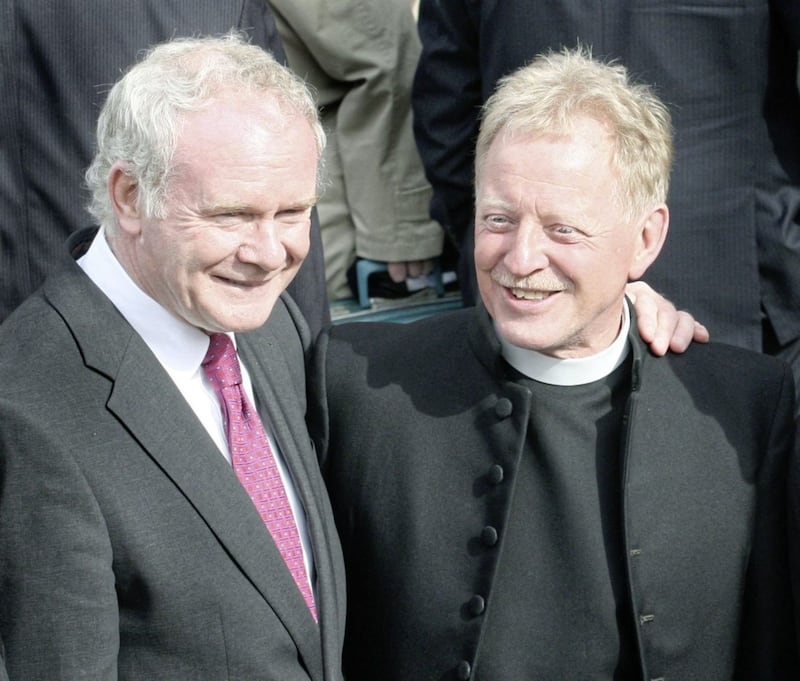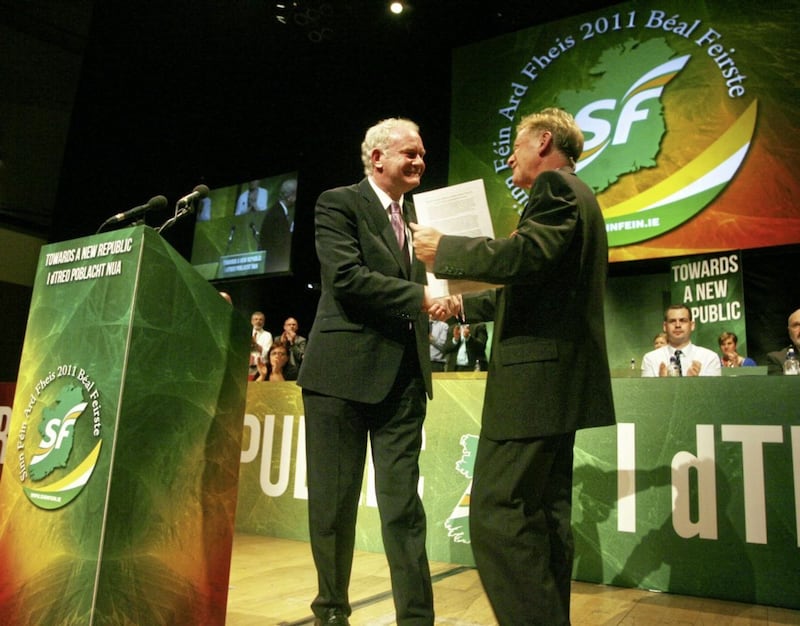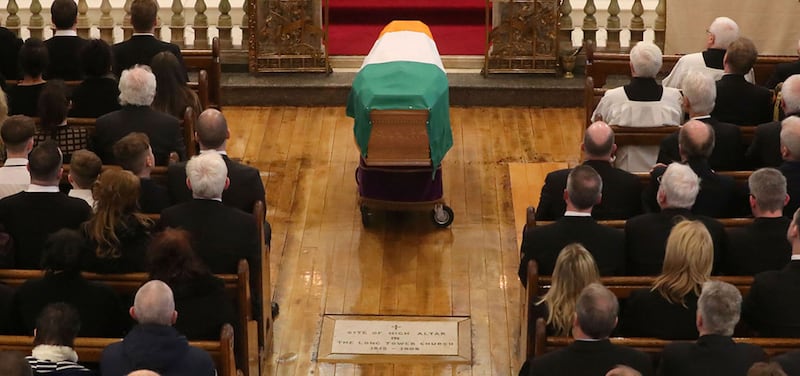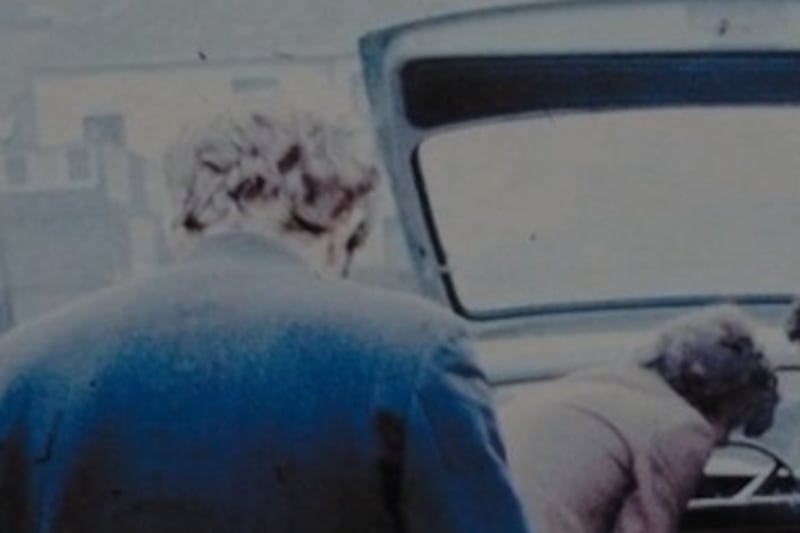A Presbyterian minister who formed an "unbelievable friendship" with Martin McGuinness has spoken of his belief that the republican leader underwent a radical change and fully embraced peace and reconciliation.
"Changing so dramatically to become the person he became and refusing to deviate, fluctuate or even hesitate on his onward journey furnishes us with evidence of God's amazing grace," said the Rev David Latimer, who writes in today's Irish News about the Mr McGuinness he knew.
Rev Latimer, who was among the clergy involved in Mr McGuinness's funeral, first encountered the former IRA leader in 2006 after appealing for his help to end attacks on his church, which overlooks Derry's Bogside.
Five members of the First Derry Presbyterian congregation were killed during the Troubles but the two men went on to forge a firm friendship.
They often prayed together and Mr McGuinness invited Rev Latimer, a former British army chaplain who served in Afghanistan, to address Sinn Féin's ard fheis in 2011 and to visit him in hospital.
------------------
MY friendship with Martin McGuinness started because of a paint bomb attack at First Derry Presbyterian Church, which is located on the city’s historic walls adjacent to the Bogside and within sight of Free Derry Corner.
During the Troubles, First Derry was frequently a target for attack; sometimes stones and bricks were launched from the other side of the walls and sometimes it was paint bombs thrown onto the fluted pillars, sandstone façade and front steps. In 1983 a section of the church was badly burned by an incendiary bomb.
One week into my ministry at First Derry, which began in 1988, my nearly-new yellow Ford Escort car was peppered with stones thrown from the other side of the walls while I was visiting the bowling club. The car was too badly damaged to be repaired.

This was a most unexpected baptism and very unsettling for my wife and three young daughters. We wondered what we had let ourselves in for by moving from the comparatively tranquil Brontë country in Co Down to the Maiden City.
Because of its vulnerable location, the church was protected by a range of security measures, such as steel shutters across every door and bullet proof covers over every window.
A serious outbreak of dry rot, discovered in early 2002, succeeded in doing what world wars, civil unrest and economic downturns could not, and the church had to close for nine years due to its unsafe condition.
It quickly became clear a substantial sum of money would be needed to repair the city’s oldest Presbyterian church.
Four years following the outbreak of dry rot, the former Derry City Council confirmed it had identified a source of finance.
Consequently, when informed by a parishioner of another paint bomb attack mid-2006 I decided rather than remain silent after these disturbing attacks, which was our custom, I would on this occasion go public.
So, the very next morning I appealed on BBC Radio Foyle to the only person in the city I believed had authority to bring the paint attacks to an end – Martin McGuinness.
Within 20 minutes Sinn Féin rang to inform me Martin would like to meet with me. Next morning we met on the front steps of the church.
This was anything but easy for the two of us; up the same church steps five coffins, containing the bodies of five First Derry parishioners killed by the IRA because of their service in either the UDR or the RUC, had been carried during The Troubles. Martin McGuinness was blamed for having played some role in each of these deaths.

The outcome of this meeting on the church steps not only brought an end to the paint and stone attacks.It unexpectedly marked the beginning of a most unlikely friendship, which developed and extended over a 10-year period.
In the beginning our meetings were quite formal, but over time we gelled and got to know and to like each other.
Martin would join with me, mainly in my home. On some occasions our conversation would be light-hearted, while at other times it would be more serious as we focused on ongoing difficult and divisive issues.
Amazingly, there were times when our meetings ended with prayer. This is all the more remarkable when I confess to never feeling inclined to pray in the company of any other public representatives or civic leaders and yet, in the company of the former IRA leader, it happened. Through our prayers we were drawn closer together.
After one of our meetings I recall saying to Martin as he was about to depart: “Martin, I really value our friendship.” Looking me straight in the eye as he held my hand he responded by saying: “David, I treasure our friendship.”
Emanating directly from our friendship was a steady evolving strand of mutual respect and understanding and our differing culture, creed and political aspirations did not interfere with our friendship.
It was this that led me, the first Protestant minister invited to address a Sinn Féin Ard Fheis in 2011, to describe Martin McGuinness as a “true great leader of modern time”.
The headline splashed across the front page of a Northern Ireland newspaper the next morning read, ‘Latimer walks on victims’ graves’.
In the days and weeks that followed there was a torrent of hate mail arriving electronically and by post.
To help explain my decision to attend the first Ard Fheis to take place in Northern Ireland and my choice of words to describe Martin, I resorted to the Bible and to characters such as Moses who murdered an Egyptian, David who arranged for Bathsheba’s husband Uriah to be transferred to the front line of battle where he was killed, and Paul who, because of his former reckless life, continued to label himself “chief of sinners”.
These Biblical examples of people who had done terrible things and yet were not rejected by the Almighty conveyed how God, whose thoughts are not our thoughts and whose ways are not our ways, can see every weed as a potential rose and every sinner as a potential saint.
Viewed from a purely human perspective, persisting with his very different direction of travel, across a decade as deputy first minister, was anything but easy.
Changing so dramatically to become the person he became and refusing to deviate, fluctuate or even hesitate on his onward journey furnishes us with evidence of God’s amazing grace, which enabled Martin McGuinness to push open a door to reveal a better and a different way of bringing about change and to tirelessly strive to shape a brighter shared living space for all.

By overcoming some of the barriers that keep us apart and by attempting to build bridges to help us get to know each other, even just a little bit better, Martin McGuinness was uncovering how, “somewhere out at the edges, the night is turning and the waves of darkness begin to brighten the shores of dawn”.
By so doing he was paying attention to the present knowing if you improve upon the present what comes later will also be better.
And he wanted the future to be markedly different especially for children growing up in every city, town and village.
He earnestly wanted young people, whom he regarded as the lifeblood of every society, to have the kind of future their grandparents could only ever have dreamed of.
Sadly, Martin McGuinness has been taken from us and we may never, as DUP Leader Arlene Foster recently said, see the likes of him again.
[Rev Latimer read a Prayer of the Faithful at Mr McGuinness's funeral]
People from both nationalist and unionist traditions whose lives have been forever scarred by the Troubles will, I know, struggle with my appraisal of Martin McGuinness.
All I can say is that all I have said is the product of an unbelievable friendship that permitted me to see another very different side to a man I got to know and to like.
As we move forward into an uncertain future, now is the time to release the need to hate, harbour division and the enticement of revenge.
Embracing Martin’s generosity of spirit and following his fine example, now is the time to let go of all bitterness and hold only love, only peace in our hearts and to reconcile ourselves to the truth that our survival hinges on our willingness to move ever closer together recognising we are only as strong as we are united.
We have isolated, excluded and judged people long enough. It’s now up to us, regardless of how we vote or where we worship, to tear down those walls, show God’s love and give peace a chance.
Rev David Latimer








